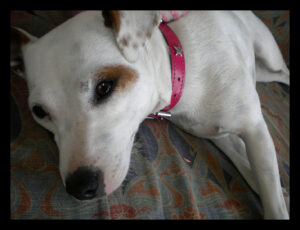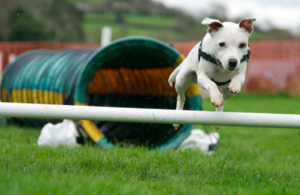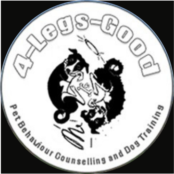
We brought Spot home when she was 8 weeks old. After Daisy died, Tim, my husband said, “if we are to get another dog (and I’m not sure that we should) we must get a small dog, a puppy of the ‘right’ age”. By this, he meant 8 weeks so that we could socialise her/him properly. The next time I went to the Moorlands Rescue kennels there was an 8 weeks old puppy there with her Mum. Thus, Spot was almost to order, although when Tim heard that she was white, his final resistance was to say “it’ll show the dirt”. Her Mum, a Jack Russell, (by her looks her Dad must be a Staffy) had been picked up in Cardiff virtually in labour and her puppies were born by Caesarean, with Spot the only surviving pup.
Despite getting her at the right age, and socialising her extensively, Spot doesn’t always behave in the way that I might wish!
- Although socially competent and friendly with people and most dogs, Spotty’s not very sociable and chooses not to be with people or other dogs. Unless there’s a chance of getting fed, she’d rather snuggle down under blanket on her own. It is likely that this is because she was an only pup and it means she’s not motivated to get on with other dogs or people because she isn’t sociable.
- Although socially competent and friendly with people and most dogs, Spotty’s not very sociable and chooses not to be with people or other dogs. Unless there’s a chance of getting fed, she’d rather snuggle down under blanket on her own. It is likely that this is because she was an only pup and it means she’s not motivated to get on with other dogs or people because she isn’t sociable.
- Spotty is very impulsive and often she can’t think and simply acts. She’s doing it before she knows she’s doing it!
- Spot doesn’t like to be handled around the top of her head and front legs. Impulsive individuals often have body handling issues
- She gets over aroused around food, she has no self-control and can’t think if she is hungry. Most training guides say ‘start with a hungry dog’ – this doesn’t work with Spot she simply can’t think. Just the food issue in itself has made her harder to train than other dogs.
- Although fine with all people, non-aggressive and essentially friendly, if someone crops up suddenly on a walk, or just outside the front door or car, she can bark (a lot). Dogs barking from behind fences and gates also really upset her. Again, this reaction will vary tremendously according to her state of mind.
- when several of these factors occur at once and the ‘triggers’ stack up, Spotty quickly becomes uncontrollable and if she is also hungry, dog help you!
……..And yes, she does show the dirt!
Amongst my friends there has been talk of builders and their houses, plumbers and their taps and mechanics and their cars.
So how to explain Spot without having to admit to not being a good trainer?
Spotty is a Terrier and a lot of her behaviour is reflective of this. Terriers have been bred as independent, aggressive killers who keep in touch whilst working by barking. They can be easy to arouse and vocal, with a low threshold for aggression i.e. they can bite first and ask questions later. Thus Terriers tend towards being genetically impulsive.
Spotty’s badly bred. Presumably, her parents’ mating was accidental. In addition to her dead siblings who were too big to be born naturally, Spotty has luxating patella’s (or a terrier skip). Spot also doesn’t she have an undercoat and is virtually bald underneath her very short topcoat. Of course, she gets cold hence the blankie.
Her poor mum would have been very stressed on the street and most likely hungry too. There is a proven link between maternal stress and impulsivity in people and rats and it is known that the offspring of rats that are stressed and starved are unable to code the proteins required to build feel good neurotransmitters. Their brains are altered before birth by their experiences in utero. Thus, maternal stress and pre-natal stress become embedded in the genetic code ‘epigenetically’. Spot’s first 8 weeks in rescue won’t have helped either.
On top of all of this, due to her impulsive nature, when she was about 2, she threw herself out of the back of the car before I could say ‘wait’ and bounced off the tow bar. Since then she has had a chronic pain issue which is exacerbated by her terrier skip.
Tim was correct, getting Spot at 8 weeks of age left a good 4 weeks of the sensitive period for socialisation giving us the opportunity to gently expose her to a broad cross section of the things that she was likely to meet in life. She met lots of friendly dogs, tonnes of friendly people of all varieties and went here there and everywhere. Whilst she’s been difficult to train, she’s actually very well trained and all of this training has been positive and confidence building.
Despite masses of positive encounters with other dogs, in common with many, Spot has also had bad experiences on walks. She was randomly attacked several times by other dogs when she was very young. One incident, where a whippet came out of nowhere and bit her on the face (drawing blood) was particularly nasty. She has also had an incident with an electric fence which left her baffled and terrified. This is similar to what an electric shock collar does, thankfully they are banned in the UK.
When she was about 6, Spotty became very anxious and stopped wanting to go on our most frequent walk, particularly when she was with me. I found this very humbling – I’m meant to be the expert after all. The truth is, I take her for most of her walks and most of the bad things have happened when she has been with me and mostly on our most frequent walk, so it makes sense – she associates bad things happening with me – there.
Although undoubtedly her breeding, developmental, experiential issues and the chronic pain problem are big players in Spot’s difficult behaviours, I believe the dye was already cast before she was born. For me, the overriding factor is that she has a ‘negative expectancy bias’, whereby she expects the worst to happen and anticipates it due to insufficient ‘feel good’ neurotransmitters.
Rover had many more bad things happen to him and whilst this unlucky start affected his behaviour, he became more and more confident and easier to manage on an almost daily basis. However, he had a ‘positive expectancy bias’
Despite all this we make sure Spotty has a good life. She’s on medication, has regular hydrotherapy and physio to help her with her back and I have worked hard to encourage her to be happy on walks again. In conclusion, she’s quirky, fun and deeply wrong and we adore her for it. She’s not a people pleaser and why should she be? In life, it’s often best to adjust one’s expectations down to avoid disappointment and self-blame, at the end of the day, you can’t make a silk purse out of a sow’s arse!
So, am I a bad trainer? My (maybe biased) conclusion is that dogs can be difficult for lots of different reasons. When people say to me, ‘I bet it’s always the owners’ fault’, my own personal experience with Spot shows me just how unhelpful this judgemental attitude is.

Spot has some undesireable ‘doggie’ habits and she saves this one for when she has an audience ideally of teenagers but also for other family or certain friends!
